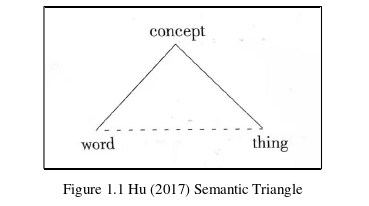联系方式
more本类最新英语论文
- 2024-04-18基于cbi的初中英语语法教学..
- 2024-04-07教师反馈与同伴反馈结合模式..
- 2023-12-10多模态教学模式应用于欠发达..
- 2023-11-30句法-语篇界面视角下中国英..
- 2023-11-19句法-语篇界面视角下中国英..
- 2023-11-05英汉散射型虚拟位移表达的比..
- 2023-11-03基于语料库的英汉词类原型范..
- 2023-10-11“跑np”构式的句法语义探讨
- 2023-06-11英语一级情态动词can和may语..
- 2023-04-28基于语料库的need和dare去语..
more热门文章
- 2010-03-11the use of conditional se..
- 2009-08-08英语语法论文:名词化的生成..
- 2009-08-08英语语法论文:英语不定式和..
- 2009-08-16对比研究运算效率与英汉双及..
- 2009-08-07英语论文:汉英动宾结构比较..
- 2009-08-16研究英汉单位词语用搭配对比..
- 2010-06-11 the comparison between c..
- 2010-05-30英语语素与音位、义素的联系
- 2009-08-16探究虚拟式中should的功能
- 2009-11-05引导的条件从句用法归纳if
more留学论文写作指导
- 2024-03-31卡森•麦卡勒斯小说中..
- 2024-03-28美国黑人女性心理创伤思考—..
- 2024-03-27乔治·艾略特《织工马南》中..
- 2024-03-21超越凝视:论《看不见的人》..
- 2024-03-19《哈克贝利•费恩历险..
- 2024-03-13心灵救赎之旅——从凯利的三..
- 2024-02-22文学地理学视角下的《印度之..
- 2023-05-03英、汉名词短语之形容词修饰..
- 2023-02-07目的论视域下5g—the futur..
- 2022-07-04二语英语和三语日语学习者的..
英语语境反义词的词汇语用学探讨
论文作者:留学生论文论文属性:硕士毕业论文 dissertation登出时间:2022-07-10编辑:vicky点击率:1291
论文字数:35633论文编号:org202207061627589085语种:英语 English地区:中国价格:$ 44
关键词:英语语法论文
摘要:本文是一篇英语语法论文,笔者认为在传统意义上,反义词指的是词汇意义相反的词。词汇意义对反义词的存在起着决定性的作用。然而,与传统的词汇反义词不同,研究发现语境在词汇关系中起着重要作用。由于语境的存在,词汇意义在特定的语用过程中会发生一定程度的变化,即词汇的语用意义。语用意义导致语境反义词的产生。
本文是一篇英语语法论文,笔者认为研究词的动态意义是词汇语用学产生和发展的重要原因。词汇语用学的两个主要理论是Grice(1975)的会话含义和Sperber和Wilson(1995)的关联理论。与会话含义相比,关联理论既继承了一些观点,又弥补了其不足。
Chapter One literature review
1.1 An Overview of Word Meaning
In 1923, Ogden and Richards published the famous and profound book The Meaning of Meaning, marking the initial birth of semantics. Lyons (2000) thinks that as one of the sub-branches of linguistics, semantics is generally defined as the study of meaning. As the unit of language, word meaning is the core and main research object of semantics, especially traditional semantics. Referential theory and representational theory are two primary theories of meaning that promote and support the advancement of semantics.
First of all, the concepts of ―denote‖ and ―refer‖ need to be distinguished here. Denote is used to describe the relationship between a linguistic expression and the world. This relationship is static and unchanging. While refer is utilized to the action of a speaker in picking out entities in the world. This action is dynamic and changing. (Saeed, 2000) Give an example to illustrate it: There is a bicycle in front of the house. In this sentence, ―house‖ and ―bicycle‖ denote a class of things in the real world. The behavior that the speaker chooses to express with these two words is referring.

As far as Saeed (2000) is concerned, the referential theory is when words and sentences are given their meaning by showing how they relate to situations. According to Hu (2017), the referential theory of meaning means that the meaning of a word is related to the thing it refers to, or stands for. In a few words, the meaning of words refers to something in nature. Meaning is a static and direct relation between words and entities in the world. The referential theory takes objective existence as the philosophical basis. Therefore, it must be something that exists in reality.
1.2 Previous Studies of Antonyms
Antonyms have always been a hot topic which scholars have discussed since time began. In contrast, although the study of antonyms in China started late, the related research did not lag too far behind. There is some overlap between domestic and foreign research. These will be discussed as follows.
1.2.1 Previous Studies of Antonyms Abroad
In English, the ―antonym‖ is a derivative word. It is derived from the Greek ―antonymia‖. The affix ―ant-‖ is equivalent to ―anti-‖, which has the opposite meaning. The affix ―onym‖ means ―name‖. (Zhang, 2010) It can be seen that the original and basic meaning of the antonym is ―opposite name‖. Later, it was gradually extended to mean ―contradiction or opposition‖.
Regarding the precise definition of antonyms, different linguists have similar opinions. Lyons (1977) holds that the technical term for oppositeness of meaning between lexemes is antonymy. According to Leech (1983), the antonym is a word of opposite meaning. In much the same vein, Saeed (2000) argues that antonyms are words that are opposite in meaning. Although the definition of antonyms has always been a topic of debate in the field of linguistics, it has always revolved around ―opposition‖. In short, antonyms are words with opposite meanings.
Chapter Two Theoretical Framework and Methodology
本论文由英语论文网提供整理,提供论文代写,英语论文代写,代写论文,代写英语论文,代写留学生论文,代写英文论文,留学生论文代写相关核心关键词搜索。

 英国
英国 澳大利亚
澳大利亚 美国
美国 加拿大
加拿大 新西兰
新西兰 新加坡
新加坡 香港
香港 日本
日本 韩国
韩国 法国
法国 德国
德国 爱尔兰
爱尔兰 瑞士
瑞士 荷兰
荷兰 俄罗斯
俄罗斯 西班牙
西班牙 马来西亚
马来西亚 南非
南非






